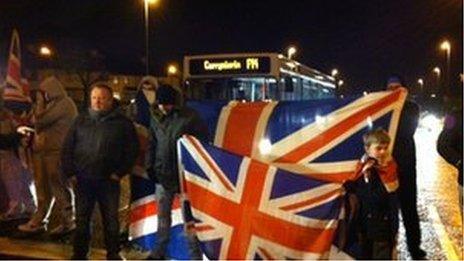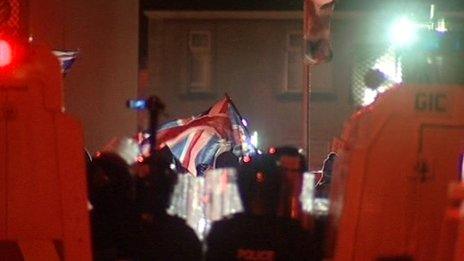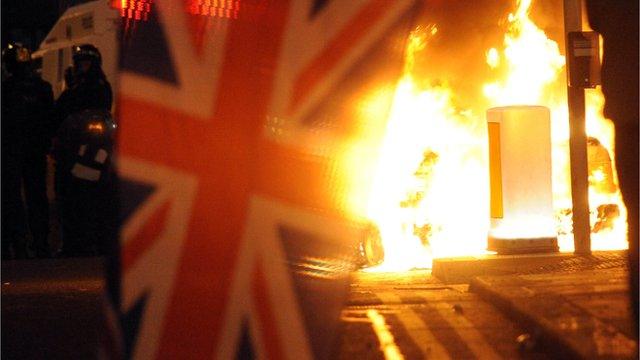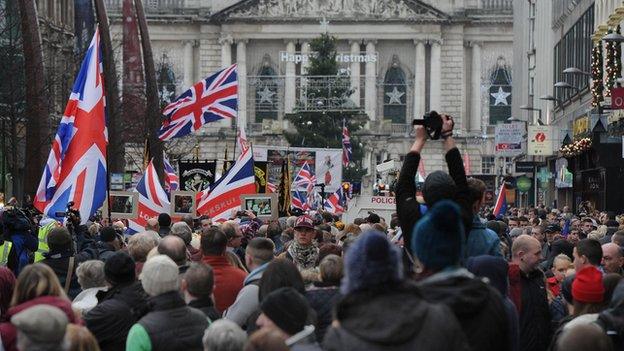Union flag protests: PSNI promises firmer response
- Published

Police are in talks with the Parades Commission about flag protests in central Belfast on Saturdays
The Police Service of Northern Ireland has said the public can expect to see a firmer response from its officers at union flag street protests.
A senior officer said they would arrest people who blocked roads, masked their faces or were involved in violence.
The PSNI has set up a dedicated team in a "major incident room" to gather evidence of criminal activity.
They are also being advised by two senior Metropolitian officers, who oversaw handling of the London riots.
The PSNI said the Met officers will not be "directly involved" in policing the flag protests, but are providing the investigative team "with expert advice and peer support".
CCTV evidence
More than 100 PSNI officers have been injured during loyalist protests since the campaign began on 3 December, following a council vote to limit the number of days the flag is flown at Belfast City Hall.
Most of the street protests have passed without incident but some have resulted in serious rioting, injuries and arrests.
On Wednesday, the PSNI said it has set up a "specialist investigative team" that will trawl through hours of video and CCTV for evidence of criminal acts such as blocking of roads, the destruction of property or the attacking of officers.
Speaking to journalists, Detective Superintendent Sean Wright confirmed that the PSNI has deployed additional officers to the operation and opened a "new, major incident room" to gather evidence on those involved in disorder.
"The team, which is made up of over 70 detectives, police staff and specialist investigators, will be relentless in the pursuit of those who are responsible for the violence in recent weeks," he said.
'Life-changing consequences'
He confirmed that 174 arrests have been made since the flag campaign began in December.
More than half of those arrested to date are under the age of 21.
Det Supt Wright added: "Persons who are masking their faces, breaking the law, involved in public disorder and blocking roads will be arrested and we want teenagers to understand that there are serious, potentially life-changing consequences to the actions they decide to take now."
He said the young people involved were risking a criminal conviction that would damage their employment prospects and limit their travel options, as it would affect future visa applications.
The officer also called on parents to take more responsibility, to know "where their children are and what they are doing" and to discuss the consequences of breaking the law.
The police are also in discussions with the Parades Commission to establish whether it should make a legal determination about flag protests at Belfast City Hall on Saturdays.
'Legal position'
The commission was set up to adjudicate on contentious marches in Northern Ireland.
Large flag demonstrations have take place in central Belfast on every Saturday since the vote was passed by councillors.
A PSNI spokesman said: "The police are involved in ongoing discussions with the Parades Commission to try and identify the best way to address the complex issues within the remit of the Public Processions Act."
A spokesperson for the Parades Commission said: "The Public Processions Act 1998 makes it clear that where people wish to process in a public place they are under a duty to notify the commission.
"The commission is currently clarifying the legal position in relation to the ongoing events taking place in Belfast on Saturdays."
- Published23 January 2013

- Published22 January 2013

- Published17 January 2013

- Published28 November 2014
